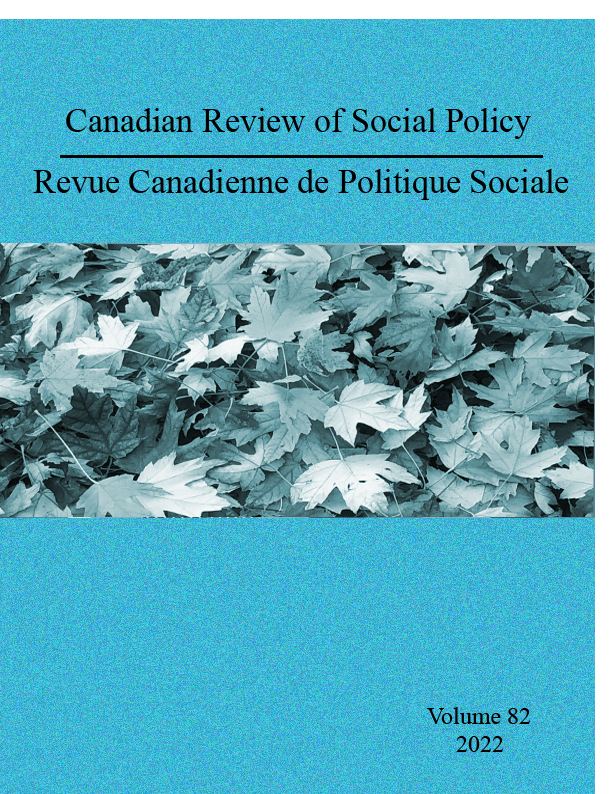What Is Behind the Fluctuations in Seniors’ Poverty Rates in Canada from 1976-2019?
Mots-clés :
pauvreté des personnes âgées, inégalité des revenus, revenu de retraite, mesure de faible revenu, mesure fondée sur un panier de consommationRésumé
Dans cet article, nous examinons les facteurs à l’origine des variations des taux de pauvreté chez les aînés canadiens de 1976 à 2019. En utilisant le seuil de pauvreté international (défini comme vivant avec moins de 50 pour cent du revenu médian national) mesuré au Canada par la mesure de faible revenu après impôt (MFR-ApI), nous notons que les taux de pauvreté des personnes âgées ont diminué de 1980 jusqu’au milieu des années 1990, mais ont augmenté depuis. Pourtant, selon l’indicateur officiel de la pauvreté du gouvernement canadien, soit la mesure fondée sur un panier de consommation (MPC), les taux de pauvreté des personnes âgées demeurent très faibles. Nous étudions ces différences dans les taux de pauvreté au fil du temps et examinons les implications pour la santé et le bien-être des personnes âgées. Nous constatons que l’augmentation des taux de pauvreté de la MFR-ApI est dictée par les inégalités de revenu croissantes parmi les personnes âgées résultant de l’accès différentiel au Régime de pensions du Canada, aux régimes de pensions d’employeur et aux régimes de pensions privés ainsi que par les inégalités de revenu croissantes entre les personnes âgées et la population en âge de travailler. La MPC n’est pas sensible à ces inégalités croissantes. Nous examinons ces résultats quant au système de retraite public sous-développé du Canada dans une optique d’économie politique où l’État-providence libéral favorise l’approvisionnement des ressources économiques privées plutôt que les ressources économiques publiques. Nous procurons aussi des recommandations de recherche et d’action pour nous assurer que la population âgée croissante du Canada bénéficie des conditions et des moyens nécessaires à la santé et au bien-être.
Téléchargements
Publié-e
Comment citer
Numéro
Rubrique
Licence
1-The author guarantees that the manuscript is an original work not published elsewhere in print or electronically in whole or in part, except in abstract form, that the author has the full power to make this contribution, and that the manuscript contains no matter libelous or otherwise unlawful or which invades the right of privacy or which infringes any proprietary right.
2-The author guarantees that the manuscript has not been previously published in print or electronically and that if the manuscript contains any tables, figures or images fully reproduced or closely adapted from previously published material, the author must obtain the necessary permission from the author/publisher holding the original copyright prior to publication in CRSP. The author may be required to produce evidence of permission granted to CRSP’s editors.
3-As a condition of publication in CRSP, the author assigns all copyright to CRSP, including but not limited to the right to publish, republish, and otherwise distribute this manuscript in print, electronic, or other formats. As CRSP is a non-profit interdisciplinary scholarly journal, the author will receive no royalty or other monetary compensation for the assignment set forth in this agreement.
For the purpose of full disclosure, CRSP will not normally use the content provided by the author in a commercial venture, but for the purpose of disseminating the author’s content to as many readers as possible. For distribution, third parties engaging in commercial activities may be contracted to distribute the content globally, and such parties may make a profit out of the author’s content in their normal course of business. CRSP will not pay the author or reimburse the author in any form based on such commercial activities because the conduct of such commercial activities is outside the control of CRSP.
Any future reference to or use of this published material by the authors must acknowledge CRSP as the original place of publication.
PERMISSION REQUEST/ARCHIVING
Permission is given to author(s) receiving funding via Tri-Council Agencies, the Canadian Institutes of Health Research (CIHR), the Natural Sciences and Engineering Research Council of Canada (NSERC) and the Social Sciences and Humanities Research Council (SSHRC), to make their publications freely available in an Open Access repository within the stated deadline by the Tri-Council Agencies (12 months following publication). Archiving of publication must be a manuscript copy bearing none of the CRSP headers, footers or any other distinguishing marks. No links to the article on the CRSP website is permitted.
Permission requests from third parties to reproduce articles in part or full in academic/educational publications can be directed to the managing editor of CRSP, and will not be unreasonably denied.

